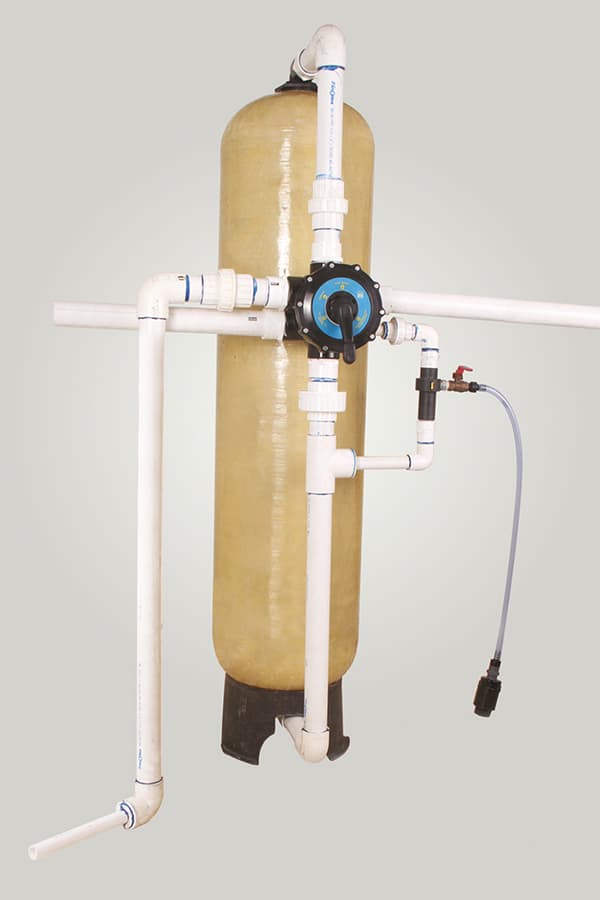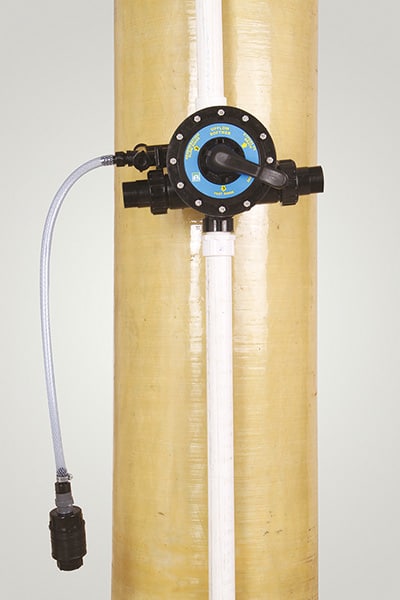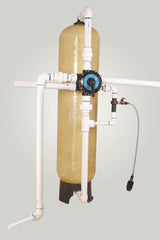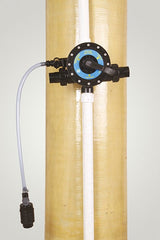Call Us Now : (+91) 8725000041




industrial water softener 2472/450
- Rs. 150,000.00
Rs. 225,000.00- Rs. 150,000.00
- (-33%)
- Unit price
- per
GST Tax calculated on checkout
Let customers speak for us
Couldn't load pickup availability
Specifications for Water Softeners: The Ultimate Guide to Choosing the Right System
Water softeners are essential for addressing the challenges of hard water. Whether you need a hard water softener for your home or a water softener system for home use, understanding the specifications ensures you select the best option. Below, we detail the key specifications to consider.
1. Water Softener Capacity
-
Flow Rate: Determines the amount of softened water the system can deliver per hour.
- Typical residential flow rates: 2000–3000 liters per hour, ideal for small to medium-sized households.
2. Resin Type and Quantity
-
Resin Type:
- The resin medium removes calcium and magnesium ions that cause hard water.
- Cation resin is commonly used for residential water softeners.
-
Resin Capacity:
- Measured in liters.
- Residential systems typically use 150–450 liters of resin, depending on the household size.
3. Regeneration Type
Regeneration ensures the resin is refreshed and ready to soften more water. Common types include:
-
Time-Based Regeneration:
- Automatically regenerates after a preset period (3–15 days based on water usage).
-
Metered Regeneration:
- Triggers regeneration based on the volume of water treated, optimizing salt and water use.
-
Manual Regeneration:
- Users manually initiate the regeneration process when needed.
4. Salt Capacity
-
Salt Storage Capacity:
- Residential models typically store 50–80 kg of salt, used during the regeneration process.
5. Dimensions and Installation Requirements
-
Dimensions:
- Common residential systems measure up to 72 inches in height and 24 inches in width.
-
Water Connection:
- Standard plumbing requirements typically require 1” to 2” pipe connections.
-
Installation Location:
- Ensure adequate space, proper drainage, and access to a power source for electric models.
6. Voltage and Power
-
Power Supply:
- Operates on standard electrical outlets, typically 220V for most models.
7. Bypass Valve
-
Bypass Feature:
- Allows the system to bypass the softener for untreated water use (e.g., gardening).
- Most residential water softeners come equipped with a bypass valve.
8. Control Head/Valve
-
Control Valve: The brain of the system, managing regeneration and water flow.
- Manual: Requires user adjustments for regeneration cycles.
9. Additional Features
-
Advanced Resin Technology:
- High-efficiency resin beads for faster ion exchange and better performance.
-
Adjustable Bypass Settings:
- Flexible bypass options for diverse plumbing setups.
Sample Specifications for a Residential Water Softener
| Specification | Value |
|---|---|
| Capacity | 50,000 liters |
| Input Hardness | 250 ppm (hard water) |
| Resin Volume | 150 liters |
| Salt Capacity | 50–80 kg |
| Regeneration Type | Time-Based / Metered |
| Dimensions | 72” H x 24” W |
| Voltage | 220V |
| Bypass Valve | Yes |
| Warranty | 1 Year |
| Control Valve | Manual |
Before purchasing and installing a water softener, a water analysis is often recommended. The analysis will:
- Determine water hardness: Measuring the calcium and magnesium levels to assess the severity of hardness.
- Identify other contaminants: Such as iron, chlorine, or sulfur that could affect the water's taste and safety.
- Help size the system: Proper water analysis ensures that the softener is correctly sized for the water usage needs of the household or business.
Water analysis may be included in the purchase process or available for an additional fee. we offer free or discounted water tests when purchasing a softener.
Once the water softener is purchased, it will be delivered directly to your address. Delivery services generally include:
- Standard shipping: Free or low-cost shipping options, with delivery times typically ranging from 10 to 25 days.
- Expedited shipping: For faster delivery, We offer expedited shipping for an additional fee.
- Assembly and setup options: In some cases, delivery can include assembly services, though this is typically separate from installation.
Ensure that your delivery address is prepared to accommodate the size and weight of the water softener.
Water softeners play a crucial role in various industrial applications by removing hardness-causing minerals, primarily calcium and magnesium, from water. These minerals can cause scaling, reduce efficiency, and lead to equipment damage. Below are some key industrial uses of water softeners:
1. Boiler Feedwater Treatment
- Purpose: Prevents scaling in boiler tubes, ensuring efficient heat transfer and prolonging the boiler's lifespan.
- Benefits: Reduces energy consumption, lowers maintenance costs, and minimizes downtime.
2. Cooling Towers
- Purpose: Prevents scale buildup in cooling tower systems, which can impair cooling efficiency and lead to corrosion.
- Benefits: Improves the lifespan and performance of heat exchangers and associated equipment.
3. Food and Beverage Industry
- Purpose: Ensures consistent water quality for product formulation, cleaning, and equipment operation.
- Benefits: Improves taste, texture, and appearance of food products while reducing equipment wear.
4. Pharmaceutical Industry
- Purpose: Provides soft water for processes like cleaning, formulation, and steam generation.
- Benefits: Meets stringent quality standards, reduces scaling in sterilization equipment, and ensures consistent results.
5. Textile Industry
- Purpose: Soft water is used in dyeing, washing, and finishing processes.
- Benefits: Improves dye absorption, prevents fabric damage, and enhances product quality.
6. Chemical Manufacturing
- Purpose: Reduces scaling in reactors, boilers, and other equipment used in chemical processes.
- Benefits: Maintains reaction efficiency and minimizes equipment failure risks.
7. Automotive Industry
- Purpose: Used in paint shops and for rinsing and cleaning components.
- Benefits: Ensures a smooth finish and prevents defects caused by mineral deposits.
8. Power Plants
- Purpose: Soft water is critical for steam generation and turbine operation.
- Benefits: Enhances efficiency, prevents turbine scaling, and reduces the risk of outages.
9. Metal Processing
- Purpose: Used in processes such as galvanizing, anodizing, and cooling.
- Benefits: Prevents scale deposits on metal surfaces and ensures consistent results.
10. Laundry and Hospitality Industry
- Purpose: Provides soft water for washing linens, towels, and other items.
- Benefits: Reduces detergent use, enhances fabric life, and improves cleaning results.
Key Advantages of Industrial Water Softeners:
- Cost Savings: Reduces energy consumption and maintenance expenses.
- Improved Efficiency: Prevents scaling, leading to better operational performance.
- Longevity of Equipment: Protects machinery and piping from mineral deposits.
- Sustainability: Reduces chemical usage for scale removal and enhances operational sustainability.
Installation
Professional installation is often recommended for water softeners to ensure proper setup. The installation process includes:
- Connecting the softener to the main water supply: This often requires shutting off the water and creating a connection between the water supply line and the softener.
- Configuring settings: Ensuring the right regeneration cycle and salt dosage settings for optimal performance.
- Testing the system: Ensuring the water softener works correctly by testing the softened water.
- Pipe installation: In some cases, plumbing adjustments may be necessary for proper installation.
The installation process typically takes a day . Some time offer same-day or more-day installation depending on location and availability.
Regular maintenance and service are essential to keep a water softener functioning optimally. Common service tasks include:
- Resin tank regeneration: Ensuring the resin beads inside the softener are cleaned and refreshed.
- Salt management: Checking and refilling the salt levels to ensure proper operation.
- System inspection: Checking for leaks, blockages, or damage to valves or pipes.
- Water quality checks: Verifying the softener's effectiveness with a water test.
we optionaly offer annual service plans or on-demand service visits for repairs and troubleshooting
Most water softeners come with a manufacturer's warranty, typically ranging from 1 years. The warranty covers the following:
- Parts: Replacement of faulty parts due to manufacturing defects.
- Salt and resin tank issues: Extended warranties might include coverage for the resin tank or salt systems in higher-end models.
Extended warranty options can be purchased for additional peace of mind. Ensure to check the terms and conditions for specific coverage and exclusions
Water softeners play a crucial role in various industrial applications by removing hardness-causing minerals, primarily calcium and magnesium, from water. These minerals can cause scaling, reduce efficiency, and lead to equipment damage. Below are some key industrial uses of water softeners:
1. Boiler Feedwater Treatment
- Purpose: Prevents scaling in boiler tubes, ensuring efficient heat transfer and prolonging the boiler's lifespan.
- Benefits: Reduces energy consumption, lowers maintenance costs, and minimizes downtime.
2. Cooling Towers
- Purpose: Prevents scale buildup in cooling tower systems, which can impair cooling efficiency and lead to corrosion.
- Benefits: Improves the lifespan and performance of heat exchangers and associated equipment.
3. Food and Beverage Industry
- Purpose: Ensures consistent water quality for product formulation, cleaning, and equipment operation.
- Benefits: Improves taste, texture, and appearance of food products while reducing equipment wear.
4. Pharmaceutical Industry
- Purpose: Provides soft water for processes like cleaning, formulation, and steam generation.
- Benefits: Meets stringent quality standards, reduces scaling in sterilization equipment, and ensures consistent results.
5. Textile Industry
- Purpose: Soft water is used in dyeing, washing, and finishing processes.
- Benefits: Improves dye absorption, prevents fabric damage, and enhances product quality.
6. Chemical Manufacturing
- Purpose: Reduces scaling in reactors, boilers, and other equipment used in chemical processes.
- Benefits: Maintains reaction efficiency and minimizes equipment failure risks.
7. Automotive Industry
- Purpose: Used in paint shops and for rinsing and cleaning components.
- Benefits: Ensures a smooth finish and prevents defects caused by mineral deposits.
8. Power Plants
- Purpose: Soft water is critical for steam generation and turbine operation.
- Benefits: Enhances efficiency, prevents turbine scaling, and reduces the risk of outages.
9. Metal Processing
- Purpose: Used in processes such as galvanizing, anodizing, and cooling.
- Benefits: Prevents scale deposits on metal surfaces and ensures consistent results.
10. Laundry and Hospitality Industry
- Purpose: Provides soft water for washing linens, towels, and other items.
- Benefits: Reduces detergent use, enhances fabric life, and improves cleaning results.
Key Advantages of Industrial Water Softeners:
- Cost Savings: Reduces energy consumption and maintenance expenses.
- Improved Efficiency: Prevents scaling, leading to better operational performance.
- Longevity of Equipment: Protects machinery and piping from mineral deposits.
- Sustainability: Reduces chemical usage for scale removal and enhances operational sustainability.
Related Products
- Rs. 150,000.00
Rs. 225,000.00- Rs. 150,000.00
- (-33%)
- Unit price
- per
- Rs. 150,000.00
Rs. 225,000.00- Rs. 150,000.00
- (-33%)
- Unit price
- per
- Rs. 150,000.00
Rs. 225,000.00- Rs. 150,000.00
- (-33%)
- Unit price
- per
- Rs. 150,000.00
Rs. 225,000.00- Rs. 150,000.00
- (-33%)
- Unit price
- per
- Rs. 150,000.00
Rs. 225,000.00- Rs. 150,000.00
- (-33%)
- Unit price
- per
- Rs. 150,000.00
Rs. 225,000.00- Rs. 150,000.00
- (-33%)
- Unit price
- per
Recently Viewed Products
- Rs. 150,000.00
Rs. 225,000.00- Rs. 150,000.00
- (-33%)
- Unit price
- per
- Rs. 150,000.00
Rs. 225,000.00- Rs. 150,000.00
- (-33%)
- Unit price
- per
- Rs. 150,000.00
Rs. 225,000.00- Rs. 150,000.00
- (-33%)
- Unit price
- per
- Rs. 150,000.00
Rs. 225,000.00- Rs. 150,000.00
- (-33%)
- Unit price
- per
- Rs. 150,000.00
Rs. 225,000.00- Rs. 150,000.00
- (-33%)
- Unit price
- per
- Rs. 150,000.00
Rs. 225,000.00- Rs. 150,000.00
- (-33%)
- Unit price
- per
- Rs. 150,000.00
Rs. 225,000.00- Rs. 150,000.00
- (-33%)
- Unit price
- per
- Rs. 150,000.00
Rs. 225,000.00- Rs. 150,000.00
- (-33%)
- Unit price
- per
- Rs. 150,000.00
Rs. 225,000.00- Rs. 150,000.00
- (-33%)
- Unit price
- per
- Rs. 150,000.00
Rs. 225,000.00- Rs. 150,000.00
- (-33%)
- Unit price
- per
- Choosing a selection results in a full page refresh.


